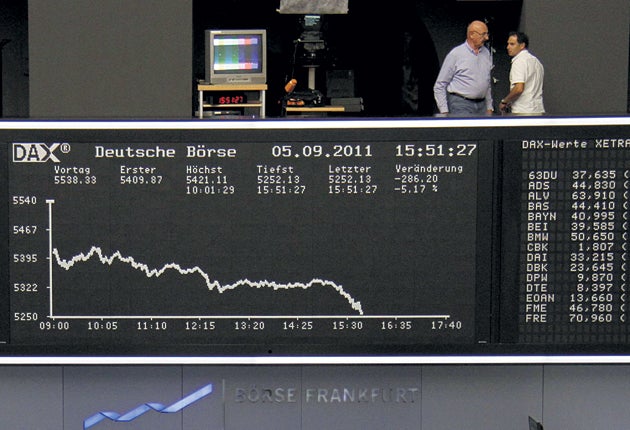
Your support helps us to tell the story
From reproductive rights to climate change to Big Tech, The Independent is on the ground when the story is developing. Whether it's investigating the financials of Elon Musk's pro-Trump PAC or producing our latest documentary, 'The A Word', which shines a light on the American women fighting for reproductive rights, we know how important it is to parse out the facts from the messaging.
At such a critical moment in US history, we need reporters on the ground. Your donation allows us to keep sending journalists to speak to both sides of the story.
The Independent is trusted by Americans across the entire political spectrum. And unlike many other quality news outlets, we choose not to lock Americans out of our reporting and analysis with paywalls. We believe quality journalism should be available to everyone, paid for by those who can afford it.
Your support makes all the difference.Banks were at the centre of another Europe-wide stock sell-off last night as concerns about global growth and the eurozone's debt woes came back to haunt investors.
The reversal wiped £49bn off the value of London's blue-chips, with the FTSE 100 sliding by 3.6 per cent to 5,102.58.
But things were worse in mainland Europe. Germany's DAX, fell by more than 5 per cent to its lowest level in nearly two years, the French and Spanish markets were 4.6 per cent lighter at the start of the week and the main Italian index was 4.8 per cent down.
Banks bore the brunt of the sell-off as traders fled on fears about the fallout of a US lawsuit over toxic mortgage debt. Royal Bank of Scotland, one of 17 lenders being sued by a federal regulator over losses on subprime bonds, fell by more than 12 per cent amid speculation about potential damages. Lloyds lost 7.5 per cent of its value.
On the Continent, lenders were hit by a revival of concerns about the sovereign debt crisis after Anglea Merkel's party was badly beaten in regional elections at the weekend, triggering fears about the German Chancellor's ability to lead Europe out of the crisis. A warning from the boss of Germany's biggest bank that many European lenders "would not survive" if they had to mark down their sovereign debt holdings to market levels added to the nervousness. "Prospects for the financial sector overall ... are rather limited," the chief executive of Deutsche Bank Josef Ackermann said.
However, he rejected a call by the chief of the International Monetary Fund, Christine Lagarde, for a forced recapitalisation of European lenders.
Join our commenting forum
Join thought-provoking conversations, follow other Independent readers and see their replies
Comments